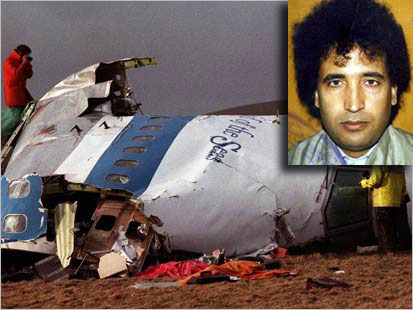
Of course, there is always the argument that it is takes a bigger person to forgive those that do wrong to them, and many British don't think he's guilty in the first place (which I think is ridiculous, seeing as the Libyan government actually accepted responsibility and paid the families compensation). Even some of the victims' families, such as the British Rev. John Mosey, whose daughter Helga, 19, died in the attack, said Wednesday he would be glad to see al-Megrahi return home."It is right he should go home to die in dignity with his family. I believe it is our Christian duty to show mercy," he said. But forgiving someone shouldn't let them off the hook (and to be honest, the Scots can hold a grudge with the best of them).
Compassion maybe be a noble sentiment, but it doesn't translate well across cultures. In the West forgiveness and mercy is a great virtue; in Libya, this gesture will be s
 een as a great weakness and Abdel Baset al-Megrahi will be welcomed home as a hero regardless of very stern warnings from the US and Britain. The Libyans, and likely very many others across the world, will give lip service to the wishes of the West, note the very conspicuous silence from the Libyan government on the matter for fear of reprisal and losing their tenuous position as an up-and-coming nation. The government knows this issue requires extremely careful handling. But behind their hands they laugh. Petals are strewn before al-Megrahi's feet, flags waved in celebration and crowds flack to welcome him home in triumph.
een as a great weakness and Abdel Baset al-Megrahi will be welcomed home as a hero regardless of very stern warnings from the US and Britain. The Libyans, and likely very many others across the world, will give lip service to the wishes of the West, note the very conspicuous silence from the Libyan government on the matter for fear of reprisal and losing their tenuous position as an up-and-coming nation. The government knows this issue requires extremely careful handling. But behind their hands they laugh. Petals are strewn before al-Megrahi's feet, flags waved in celebration and crowds flack to welcome him home in triumph.
And what about the other victims' families? Many of the passengers were Americans, and their loved ones aren't inclined to show compassion. "I'm totally against it. He murdered 270 people," said Paul Halsch of Perinton, New York, who lost his 31-year-old wife in the attack. "This might sound crude or blunt, but I want him returned from Scotland the same way my wife Lorraine was ... and that would be in a box."
Regardless of what the courts think "just," the question of what is "fair" remains. And we must ask ourselves how and when mercy and compassion can play a role in the criminal justice system, especially in cases of such extreme hate and cruelty.
For more from the AP News story, visit the below link.
http://www.optimum.net/News/AP/Article?articleId=599375&categoryId=22.
















